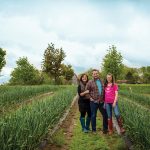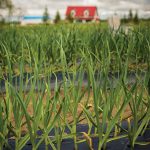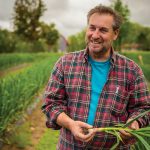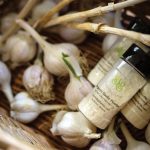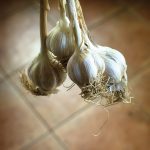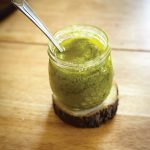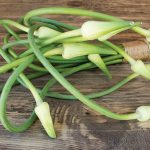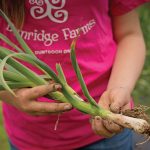Dunridge Farms brings organic, sustainable garlic to Southern Georgian Bay.
by Emily Worts
photography by Kristie and Brenden Woods
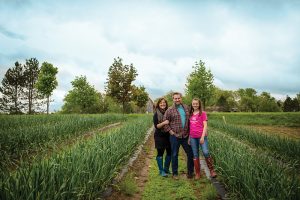
Today I am in one of 6,800 cars that will drive past the giant garlic bulb, swaying in the relentless wind on Highway 124 just north of Duntroon, which marks the entrance to Dunridge Farms. I know this because the farm’s owner, Tim Schneider, told me so. And he has done his research.
Schneider is a strategic planner by profession; a garlic farmer and cider maker by passion. He has researched climate change, carbon inputs and energy efficiency for his entire career, and has applied that knowledge to his family’s 100 acres, turning it into an organic, sustainable farm. From soil type (Harriston loam) to wind velocity (strong) to the years of experience acquired and shared by local elders, Tim and his wife Kimberly have found the perfect microclimate to grow garlic and the optimum site for farm-gate sales.
The Schneiders bought the property in 2003 and erected a small building on it before moving to England on business with their three young girls. They were abroad for seven years and in that time had their farm and its soil managed organically. “It was important to me that the kids could run outside and I didn’t want to worry about our water,” says Kimberly of their initial decision to grow organically.
The soil was ready to plant upon their return in 2010. They immediately hired a consultant, did some soil research and decided what crops would be “awesome as opposed to just good,” recalls Tim.
While not many farms at that time were growing Ontario garlic on any sort of scale, garlic fit all the requirements for the property’s growing conditions. “Garlic is what got us started,” says Tim. “It’s what got me passionate about farming.”
In addition to the 50,000 garlic cloves the family planted last fall (which they hope to double this year) the Schneiders also grow organic black turtle beans and heritage apples (including Snows, Golden Delicious and Cortlands), which are harvested to make Dunridge Farms sweet and hard cider.
“We don’t know what is going to happen in farming,” says Tim. “What we’re trying to do is diversify between everything that is viable here.”
Diversification makes sense on a small family farm, especially when growing organically, to reduce risk and maintain self-sufficiency, he explains. “Our crops are high risk because we use our soil to grow food, not chemicals.”
In spite of diversification, the garlic remains the main draw that brings people to the farm gate and takes the Schneiders out to local farmer’s markets, including Collingwood’s and Creemore’s.
On a summer Saturday, you will see Tim or one of his three daughters tying one-pound bunches of garlic – stalks and all – at the farmer’s markets. The Schneiders believe leaving the stalks on the bulbs improves the flavour of the garlic, but they also leave the stalks on to assure customers that their garlic is grown locally and organically.
“Because of the size, people think it can’t be organic,” says Kimberly of their large garlic bulbs.
The Schneiders attribute the colossal size of their garlic to three things: proper watering, exceptional seed stock (they plant a hybrid variety which is a cross of German Rocambole and Music), and trimming the scapes when they have curled one-and-a-half times.
Tim also likes to keep the stalks on their bundles of garlic because a lot of people don’t know what a garlic plant looks like, he says.
“Garlic has been around for years in family gardens, but it’s a relatively new product for a lot of people,” he says.
For the Schneiders, much of what they do is about education. “It makes me sad to think there is a whole community of people who don’t know what to do with fresh products,” says Kimberly.
The Schneiders host volunteers from Barrie’s “Eat Your Town” movement in an attempt to help educate young and old. Last July a dozen volunteers signed up to be “farmer for a day,” exchanging their labour for a hands-on learning experience and lunch, with a portion of the harvest going to a Barrie-area food bank.
Through initiatives like Eat Your Town and an annual garlic festival Dunridge Farms hosts, Kimberly’s goal is to help grow the collective knowledge around local, fresh, sustainable and organic food.
Dunridge Farms sets aside its largest and nicest heads of garlic to process for seeds, which are sold online and at the farm gate. The success of the seed business means Dunridge garlic is propagating in private gardens across Ontario and has also been planted in elementary and high school gardens in the area. It thrills Kimberly to know that in some small part she is helping to raise awareness, not just about garlic, but about growing in general.
The Schneiders are committed to continuous learning themselves. Tim’s ancestors on his mother’s side were part of the original local pioneer movement in the mid-1800s, and were farmers through the generations, but the Schneiders admit much of that knowledge has been diluted over the years. To fill in the gaps, they rely heavily on the expertise of local elders to answer their questions about everything from soil health to wind patterns.
In addition to raw garlic, Dunridge Farms offers value-added products that are in equally high demand. Garlic stores well and lasts for about nine months, after which Kimberly dehydrates any that is left over from the fall harvest and grinds it into garlic powder. This spring she processed over 20 pounds of powder and it was gone within a week.
The family harvests the garlic in late spring. Trimming the scape – the curly green stalk that will eventually turn to flower – is an essential part of growing garlic successfully.
“Scapes are a mystery to many,” says Tim. “Some cultures covet them; some compost them, thinking they’re not worthy.”
Kimberly thinks they’re more than worthy and makes the most of this delicious part of the garlic plant by blending the scapes into pesto. Two of the Schneider daughters have nut allergies, so Kimberly came up with a pine nut alternative for her scape pesto. Using the commercial kitchen at the Collingwood Community Food Cooperative, she processes her pesto with roasted pumpkin seeds and sells it at the farmer’s markets.
If you are part of the Schneider inner circle (and you help pick the scapes), you may be lucky enough to enjoy her pesto field-side with fresh pasta, as a reward for your labours. Kimberly is known for taking her food processor down to the field, plugging it into the generator and making a pesto lunch on the spot, enjoyed with jugs of Dunridge cider, of course.
For centuries, garlic has been coveted as an essential element in Mediterranean cooking. More recently the health benefits of garlic have been touted in mainstream media. Today most kitchens can’t function without it.
“So many people come for health reasons, they eat a clove a day, drink garlic and lemon, put it in their green smoothies,” says Tim. “I don’t promise anything, but it’s no secret that it’s good for you.”
Health and therapeutic benefits are a bonus, but for me, garlic is a staple of my diet and my cooking simply because it is delicious. Knowing that it is being grown sustainably, organically and flavourfully just down the road means I can add yet another item to my ever-growing list of why I love living where I do. ❧
Recipe
Scape Pesto
Kimberly Schneider created this recipe for pesto using garlic scapes from the farm and pumpkin seeds as an alternative to pine nuts (two of her daughters have nut allergies). Kimberly sells her pesto at the Collingwood and Creemore farmer’s markets and shared her recipe so On The Bay readers can make it at home.
Ingredients
- 1/3 cup raw organic pumpkin seeds
- 1/4 tsp kosher salt
- 20 small, tender garlic scapes, washed and trimmed
- 1 cup fresh parsley leaves
- 1/3 cup extra-virgin olive oil
- 2 tsp lemon juice
- Grated parmesan cheese (optional)
- Red pepper flakes (optional)
Instructions
- Spread pumpkin seeds on baking sheet and roast in 350°F for 7-10 minutes (until golden and puffed). Let cool.
- Place in blender with salt and pulse a few times until just chopped up. Set aside.
- In the blender, pulse scapes and parsley until just combined. With motor running, add olive oil until mixture comes together.
- Stir in lemon juice and pumpkin seeds.
- Add cheese and pepper flakes if using.
Dunridge Farms products are available at:
- Farm Gate, 3079 County Road 124 Duntroon
- Farm to Table Market & Kitchen, 65 Simcoe St., Collingwood
- Creemore 100 Mile Store, 176 Mill St., Creemore
- Creemore Farmer’s Market
- Collingwood Farmer’s Market
- Community Food Co-op, 65 Simcoe St., Collingwood
- The Healthy Butcher, 565 Queen Street West, Toronto
Contact:
705-994-3764
info@dunridgefarms.com
Or on facebook @dunridgefarms







